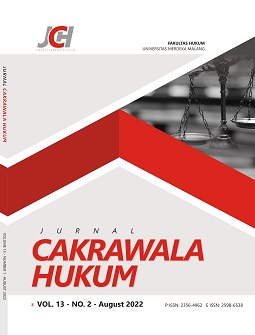The Ideality of Implementing Administrative Sanctions Against Environmental Damage
DOI:
https://doi.org/10.26905/idjch.v14i2.10420Keywords:
Administrative Sanctions, Administrative Fine, Supervision.Abstract
Based on the Government Regulation in Lieu of Law, it has reduced and changed the nomenclature for the imposition of administrative sanctions against environmental pollution and damage. As regulated in the Implementation of administrative sanctions from the instrument, five points are regulated by the government sanctions instrument. This article uses normative research methods with statutory and analytical approaches. Using primary and secondary data types using deductive logic analysis methods. The results of this study indicate that there is a change in administrative sanction arrangements, especially in administrative fines, where there is no specific indicator in providing the amount of fines. The revocation of business licenses is certainly in line with Good Governance, which lies in legal certainty, effectiveness, and efficiency. This is because the government has full responsibility for the legal position that is made to be implemented as fairly as possible. In addition, the government plays an active role in maximizing administrative law instruments wisely and responsibly.
How to cite item: Ismail, Muhammad Rizky Akbar, and Lego Karjoko. “Ideality of Implementation Administrative Sanctions Against Environmental Damage in Indonesia.†Jurnal Cakrawala Hukum 14 no. 2 (2023): 200-211. DOI: 10.26905/idjch.v14i2.10420.
References
Agustina, Enny. “IMPLEMENTATION OF THE REGIONAL GOVERNMENT AND ADMINISTRATIVE SANCTIONS IN INDONESIAN REGIONAL REGULATIONS.†Humanities & Social Sciences Reviews, (January 19, 2020). https://doi.org/10.18510/hssr.2020.8125.
Ali, Mahrus, Wahyu Priyanka Nata Permana, Syarif Nurhidayat, M. Syafi’ie, Andy Nugraha Triwantoro, and Alif Lukmanul Hakim. “Punishment without Culpability in Environmental Offences.†Cogent Social Sciences 8, no. 1 (September 6, 2022). https://doi.org/10.1080/23311886.2022.2120475.
Amiq, H. Bachrul, S.H., and M.H. “ADMINISTRATIVE SANCTION IN ENVIRONMENTAL LAW.†Zenodo (CERN European Organization for Nuclear Research), (June 30, 2018). https://doi.org/10.5281/zenodo.1299906.
Asrun, Andi Muhammad. “DAMPAK PENGELOLAAN SAMPAH MEDIS DIHUBUNGKAN DENGAN UNDANG-UNDANG No 36 TAHUN 2009 TENTANG KESEHATAN DAN UNDANG-UNDANG No. 32 TAHUN 2009 TENTANG PERLINDUNGAN DAN PENGELOLAAN LINGKUNGAN HIDUP.†Pakuan Justice Journal of Law (PAJOUL), (May 16, 2020). https://doi.org/10.33751/pajoul.v1i1.2037.
Djayaputra, Gunawan. “Analysis of Natural Resources Management in Indonesia: Environmental Law Perspective.†International Journal of Social Science and Public Policy, (January 31, 2021), 1–12. https://doi.org/10.33642/ijsspp.v3n1p1.
Farda, Muhammad, and Chandra Balijepalli. “Exploring the Effectiveness of Demand Management Policy in Reducing Traffic Congestion and Environmental Pollution: Car-Free Day and Odd-Even Plate Measures for Bandung City in Indonesia.†Case Studies on Transport Policy 6, no. 4 (December 1, 2018): 577–90. https://doi.org/10.1016/j.cstp.2018.07.008.
Hamid, Adnan, and Hasbullah Hasbullah. “Legal Hermeneutics of the Omnibus Law on Jobs Creation: A Case Study in Indonesia.†Beijing Law Review 13, no. 03 (January 1, 2022): 449–76. https://doi.org/10.4236/blr.2022.133028.
Held, David. “LAW OF STATES, LAW OF PEOPLES: Three Models of Sovereignty.†Legal Theory 8, no. 1 (March 1, 2002): 1–44. https://doi.org/10.1017/s1352325202081016.
Herlina, Nina. “PERMASALAHAN LINGKUNGAN HIDUP DAN PENEGAKAN HUKUM LINGKUNGAN DI INDONESIA.†Herlina | Jurnal Ilmiah Galuh Justisi, (May 16, 2017). https://jurnal.unigal.ac.id/index.php/galuhjustisi/article/view/93/85#.
Hermanto, I Dewa Made Suartha Hervina Puspitosari, Bagus. “RECONSTRUCTION COMMUNAL RIGHTS REGISTRATION IN ENCOURAGING INDONESIA ENVIRONMENTAL PROTECTION,†(March 11, 2020). http://sersc.org/journals/index.php/IJAST/article/view/6085.
Najicha, Fatma Ulfatun, I Gusti Ayu Ketut Rachmi Handayani, and Hartiwiningsih. “Legal Protection ‘Substantive Rights for Environmental Quality’ on Environmental Law against Human Rights in the Constitution in Indonesia.†Proceedings of the International Conference on Law, Economics and Health (ICLEH 2020), (January 1, 2020). https://doi.org/10.2991/aebmr.k.200513.136.
Sahide, Muhammad Alif K., Micah R. Fisher, Nasri Nasri, Wiwik Dharmiasih, Bart Verheijen, and Ahmad Maryudi. “Anticipating a New Conservation Bureaucracy? Land and Power in Indonesia’s Essential Ecosystem Area Policy.†Land Use Policy 97 (September 1, 2020): 104789. https://doi.org/10.1016/j.landusepol.2020.104789.
Situmeang, Nelly Marisi. “Licensing for Hazardous and Toxic Waste Management: A Study on Environmental Administrative Law (Case Study: Court Judgment Number 1872/PID.B/:H/2015 /PN.LBP).†Talenta.Usu.Ac.Id, (March 26, 2022). https://doi.org/10.32734/jeds.v3i1.7824.
Sopian, and Sri Rahayu Pudjiastuti. “GLOBAL ISSUES OF ENVIRONMENTAL LAW ENFORCEMENT IMPACTS ON SUSTAINABLE DEVELOPMENT.†JHSS (Journal of Humanities and Social Studies) 5, no. 1 (March 29, 2021): 56–62. https://doi.org/10.33751/jhss.v5i1.3226.
Sunggara, M. Adystia, and Endra Wijaya. “Criminal Law Politics in the Management of Natural Resources: Efforts to Confront the Positivistic Thinking Absolutism.†Proceedings of the International Conference on Law, Economics and Health (ICLEH 2020), (January 1, 2020). https://doi.org/10.2991/aebmr.k.200513.003.
Suprapto. “Highlighting the Legislation Concerning Environmental Protection and the Promotion of Sustainability within Indonesia,†(December 31, 2022). https://ijcjs.com/menu-script/index.php/ijcjs/article/view/540.
Demak, Astri Anggreani Kiay., Henry R. Ch. Memah., and Alsam Polontalo., “View of PENERAPAN SANKSI ADMINISTRASI DALAM UPAYA PERLINDUNGAN DAN PENGELOLAAN LINGKUNGAN HIDUP,†Lex Administratum, Vol. VIII No. 3 (Jul-Sep 2020), https://ejournal.unsrat.ac.id/v3/index.php/administratum/article/view/29761/28822.
Pratiwi, Dian Esti., Hartiwiningsih, and tika Andarasni Parwitasari,. “LEGAL POLITICS ON FLY ASH BOTTOM ASH WASTE CONVERSION INTO NON-B3 WASTE AFTER LAW NUMBER 11 OF 2020 CONCERNING JOB CREATION IN INDONESIA.†Russian Law Journal 11, no. 2s (March 31, 2023). https://doi.org/10.52783/rlj.v11i2s.700.
Downloads
Published
How to Cite
Issue
Section
License
Authors who publish in this journal agree to the following terms:
The copyright of the received article shall be assigned to the journal as the publisher of the journal. The intended copyright includes the right to publish the article in various forms (including reprints). The journal maintains the publishing rights to the published articles. Authors must agree to the copyright transfer agreement by checking the Copyright Notice column at the initial stage when submitting the article.





